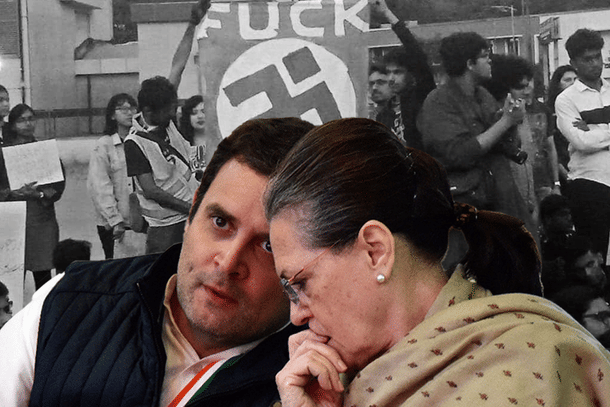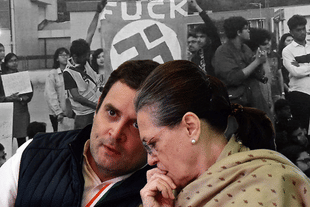Politics
Congress Wasn’t Against Citizenship For Minorities From Neighbourhood, Its Anti-CAA Stand Is Driven By Its Sinking Electoral Fortune
Karan Bhasin
Jan 21, 2020, 12:26 PM | Updated 02:35 PM IST
Save & read from anywhere!
Bookmark stories for easy access on any device or the Swarajya app.


An extract from B R Ambedkar’s book, Pakistan or the Partition of India makes his views on the need for population transfer explicit. The sentiment prevailed regarding the possibility of such an operation as the only solution to addressing the apprehensions of minorities, yet such an operation did not take place.
Some scoff at the idea of the shifting and exchange of population. But those who scoff can hardly be aware of the complications, which a minority problem gives rise to and the failures attendant upon almost all the efforts made to protect them. The constitutions of the post-war states, as well as of the older states in Europe which had a minority problem, proceeded on the assumption that constitutional safeguards for minorities should suffice for their protection and so the constitutions of most of the new states with majorities and minorities were studded with long lists of fundamental rights and safeguards to see that they were not violated by the majorities. What was the experience? Experience showed that safeguards did not save the minorities. Experience showed that even a ruthless war on the minorities did not solve the problem.
The states then agreed that the best way to solve it was for each to exchange its alien minorities within its border, for its own which was without its border, with a view to bring about homogeneous States. This is what happened in Turk(e)y, Greece and Bulgaria. Those, who scoff at the idea of transfer of population, will do well to study the history of the minority problem, as it arose between Turk(e)y, Greece and Bulgaria. If they do, they will find that these countries found that the only effective way of solving the minorities problem lay in exchange of population. The task undertaken by the three countries was by no means a minor operation. It involved the transfer of some 20 million people from one habitat to another. But undaunted, the three shouldered the task and carried it to a successful end because they felt that the considerations of communal peace must outweigh every other consideration.
On 25 November 1947, the Congress Working Committee had a meeting where it passed a resolution urging citizenship for refugees of Pakistan. Maulana Abul Kalam Azad, incidentally, highlighted the extent of persecution of Hindus which would be a distinct possibility in Pakistan resulting in them migrating to India or other countries.
The experience in the first 10 days of Partition in itself was enough for anyone to arrive at such a realisation.
Even Mahatma Gandhi mentioned that Hindus and Sikhs, who wished to come to India, had complete right to do so, and they would be provided citizenship by the government along with adequate employment opportunities.
Jawaharlal Nehru too is on record stating that minorities in Pakistan belong to India and they shall continue to do so. He mentioned that irrespective of whenever they come, they would be accepted and conferred Indian citizenship.
However, a formal provision or a special window to confer citizenship did not exist while persecution of minorities continued for decades.
In 2003, none other than Dr Manmohan Singh raised the issue of persecution of minorities in Bangladesh seeking to grant them citizenship.
The issue was also raised in 2015 in Assam when Anjan Dutta, a Congress leader from the state, highlighted during an executive meeting that the party will take the issue of citizenship for the Bengali minorities, who came to Assam after facing persecution post the Partition of India.
The 2018, Congress manifesto of Rajasthan too voices support for the need to grant citizenship to persecuted minorities form our neighbours.
The recent opposition to the Citizenship Amendment Act (CAA) is perhaps driven by the falling electoral fortunes of the Congress party which is going against not just Nehru but also B R Ambedkar.
NPR, NRC And The Hypocrisy
There has been a trend where many prominent individuals are stating that they won’t show their papers to prove their citizenship. This has also been a feature of the CAA protests which have little to do with identification of illegal immigrants but is more focused on conferring citizenship.
On the NRC or National Register of Citizens, is the opposition trying to say that it is keen to have illegal immigrants, even if they are granted citizenship in future but it does not wish to confer citizenship to religiously persecuted minorities in the three countries of Pakistan, Bangladesh and Afghanistan?
The central issue of the NRC is not of proving citizenship, but it is an issue of sovereignty where one focuses on identification of illegal immigrants.
The NRC is not against migrants who have come legally with due paperwork in place. The first thing is to understand the difference between illegal and legal migrants — the NRC focuses only on the former.
No country would want to allow illegal immigrants to reside and obtain its citizenship as it raises several questions regarding national security, sovereignty and of social unrest due to rapid changes in cultural demographics.
Therefore, the question at hand should be whether we want to identify illegal immigrants and resolve the problem, or not. The answer to this is a normative answer and we must resolve the problem.
This brings us to a question of how the identification will happen and this is a question regarding administrative constraints, state capacity and a host of other issues.
These issues must be debated, discussed and deliberated to evaluate the feasibility of the NRC — but to assume that it cannot be done and sit on a protest at a time when it is not even known whether it will happen is absurd to say the least.
India is nothing beyond its people, it is not the land, or the rivers that flow through them, but it is the heterogeneous religious, cultural and linguistic groups that flourish within the region.
Therefore, identification of who is an illegal immigrant is integral to strengthen our democracy. How can it be done and whether it will be done is a subject that can be debated, that must be debated.
It is also worth iterating that P Chidambaram of Congress is on record stressing on the need for the NRC while they were in government.
Consequently, at the bare minimum, there should be an agreement on the need to identify illegal immigrants. Yet, that agreement remains elusive due to political interests of the opposition.
A consequence of this has also been a routine exercise that was also undertaken during the 2011 Census which was of the National Population Register (NPR).
To derail such routine administrative exercises for political purposes reeks of a deliberate attempt to subvert the mandate of people of the country, which elected the government with 303 seats.
It is also worth iterating that this mandate came despite complete transparency as Bharatiya Janata Party (BJP) mentioned both the CAA and NRC in its manifesto.
The failing electoral fortunes of the Congress has resulted in adoption of their old methods practiced frequently by Indira Gandhi. The only difference is she used the state’s administrative capacity to subvert democracy by imposition of Emergency.
Her descendants don’t have that privilege and consequently, they are using a strategy of minority appeasement and instigating violence to derail the process of India’s development.
The objective seems to be to grab political power without having the necessary mandate from the people and that is what true fascism looks like!




